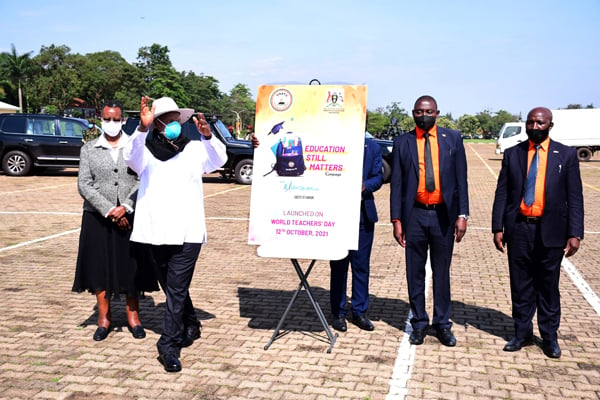Prime
Formal education in rural Uganda is dying

Author: Nicholas Sengoba. PHOTO/NMG
What you need to know:
- Pregnancy, bereavement, illness and other challenges mean that they have to get used to having 5 teachers at the school on average. The teachers have their own business to attend to like herding their goats, tending to their gardens and riding their boda bodas.
It is in the detail that the devil finds abode. Primary Leaving Examinations (PLE) results recently released by the Uganda National Examinations Board (UNEB) have some sobering numbers. But we are used to the trend.
A total of 714,702 of 811,810 candidates who sat for the examinations have passed and can proceed to post-primary education. 97,109 candidates were not graded. 20,940 students were absent; 17,253 from the ‘free’ Universal Primary Education (UPE) scheme and 3,687 non-UPE. Urban schools - which now means the schools in Kampala, Wakiso and the areas in proximity to the capital city - always return the best grades.The grades start fading out as you move further away from the lights of Uganda’s dusty and potholed capital.
I took a trip to meet a head teacher of one of the schools that rejoice and thank God when they get one ‘bad’ first grade (in urban school terms,) anything like aggregate 10 - 12. Then a bulk of second grades ranging from 16 - 24, then another sizable amount of third grades and maybe one or two fourth grades. To put this into context, in many schools in Kampala and Wakiso it is normal for all the students to get only first grades, with a good number being the perfect four . The ones which ‘do badly’ will add in there, one or two good second grades; on the cusp of the first and second grade.
According to the surprisingly passionate and optimistic head teacher, everyday is a struggle. They made a heart-melting patriotic claim; ‘we are determined to teach Uganda’s children regardless, because of the noble calling of teaching. It gives us a lot of gratification when our ‘products’ move on in life and become useful citizens.’
The government’s annual contribution to the school is almost negligible to adequately cater for even a school term. Yet the parents who take their children to the school are under the impression that the government pays for everything. They don’t want to make any financial contribution towards meals and scholastic materials. Some can’t even afford to pay for the cheap school uniforms.
The parents never attend meetings to acquaint themselves with the goings on at the school but turn up to blast the school for failing to teach their children to pass PLE.
In fact they will at the slightest opportunity disrupt teaching and learning by picking up their children from school to go and help with ‘productive work’ back home like harvesting crops.
Absenteeism is always a given if say a parent is sick, then children may have to go to fill in for them in the domestic setting; doing house chores, gardening or managing the stall in the market. Running in and out of school not only disturbs concentration but also knocks some permanently out of the system as they taste ‘better things’; like jobs in markets that offer some money to buy mobile phones.
In other instances girls get married. This category often returns when the new found hope and joy dries up. So it is not uncommon to find a PLE candidate who has been in and out of the primary school setting for 15 years, now aged 22, with a child or two, trying out their luck at PLE exams.
The day scholars are supposed to carry a snack or meal to eat during their time at school. Meals in the boarding section are supposed to be paid for. The one who does not pay for meals may go home and eat while the one in the boarding section is often fed on ‘humanitarian grounds.’
The school is overwhelmed by the many cases of pupils who want a free lunch. When it runs out of money or is under immense financial pressure, then the meals are provided to only those who pay. That is when ‘free lunchers,’ start ‘falling sick’ only to be cured when given some posho and beans or porridge.
Some drop out due to hunger. Some with a misguided sense of entitlement grumble about ‘favoritism’. This disadvantages the parents who pay for meals and brings more pressure on the head teacher and their staff. There are instances where the parent and their pupil go school hopping. One term or year to one school here, another there. They are running away from school dues that would be pocket change for a lower scale salary earner in the city.
In other cases parents can only afford to maintain their students in school for only one or two terms. They turn up at school in the first for ‘orientation’ and third term to sit exams to be promoted to the next class.
Many times this student has hardly grasped anything but is simply promoted ‘automatically.’ Because of that, they increasingly become frustrated as they hardly comprehend anything in school and eventually drop out.
The two year Covid-19 lockdown sent many away. The head teacher managed to bring some back by persuading them individually about the importance of formal education. This is during accidental meetings at the market, on the road, at places of worship or in other public spaces.
That is a snippet about the pupils. You have the teachers whose salaries come in late in an environment where they are overwhelmed by the number of pupils. Out of the minimum number of 15 teachers our head teacher is supposed to supervise, they have only 7.
Pregnancy, bereavement, illness and other challenges mean that they have to get used to having 5 teachers at the school on average. The teachers have their own business to attend to like herding their goats, tending to their gardens and riding their boda bodas. These make their teaching sound more like moonlighting. It is very difficult to discipline them for fear of losing them altogether, moreover for doing things that are ‘justified.’ But every cloud has a silver lining.
Some former pupils who ‘made it’ will occasionally send some chalk, exercise and text books, copies of the curriculum (yes to avoid reading out of topics) old computers and other scholastic materials. For some it is books, the dilapidated buildings that house the pupils.
If they don’t because it is not their obligation, then the struggle continues. Now that is the pupil supposed to compete with kids in Kampala schools who are studying full time. They have all the necessities available including parents signing their homework on a daily basis and giving them textbooks, extra lessons and nutritious foods.
Look at the cut-off entry points in upcountry secondary schools. For instance Atang S.S Pader has set theirs at 28 for girls and 22 for boys. In the Kampala schools even a 5 may see one sweating to get in. In the provinces they expect pupils who have little, have been given little and will continue getting little because they are flat on the ground. It is little wonder that the cohort of candidates who joined primary in 2016 numbering about 1,880,000 only 832,000 registered at the finishing line in 2022.
Then the 97,000 who are ungraded and the 20,900 who were a no-show. You bet, most of the million plus who dropped out are from the so-called bush schools in the provinces. Formal education in rural Uganda is dying. Poverty will bury it.
Twitter: @nsengoba




